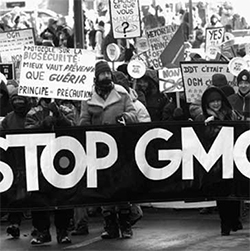
Tribunal Judges: Monsanto Isn’t Feeding the World – It’s Undermining Food Security
The Monsanto Tribunal's damning ruling denounces the company's harmful impacts on food sovereignty, agricultural production, access to nutrition, the natural environment, seed diversity, climate change, pollution and traditional cultural practices.
April 24, 2017 | Source: The Ecologist | by Claire Robinson
Five international judges say Monsanto’s activities have negatively affected individuals, communities and biodiversity, writes Claire Robinson. The Monsanto Tribunal’s damning ruling denounces the company’s harmful impacts on food sovereignty, agricultural production, access to nutrition, the natural environment, seed diversity, climate change, pollution and traditional cultural practices.
Today’s dominant agro-industrial model is highly problematic not only due to its dependence on dangerous chemicals, but also due to its negative effects on climate, its impact on the loss of biodiversity, and its inability to ensure food sovereignty.
Monsanto promotes its genetically modified (GM) crops and associated pesticides on the claimed grounds that they are needed to help ‘feed the world’.
But the five judges of the Monsanto Tribunal found that far from contributing to food security, Monsanto’s activities have “negatively affected food availability for individuals and communities.”
The judges of the Tribunal, held last October in The Hague, listened to the testimony of 28 witnesses from around the world whose health and livelihoods had suffered as a result of Monsanto’s products and activities.
The judges are all renowned for their expertise in human rights and international law issues. They were led by the Belgian Françoise Tulkens, former vice-president of the European Court of Human Rights.
